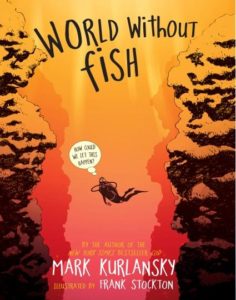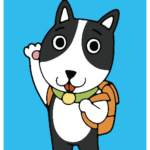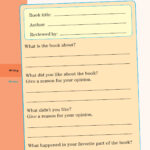 I know we just told you recently that there are plenty of fish in the sea, but… in reality, that adage may be on the verge of irrelevance. Just last month was the one-year anniversary of the BP oil spill in the Gulf of Mexico, a solemn reminder that there is much work to be done if we are to save our oceans from disappearing.
I know we just told you recently that there are plenty of fish in the sea, but… in reality, that adage may be on the verge of irrelevance. Just last month was the one-year anniversary of the BP oil spill in the Gulf of Mexico, a solemn reminder that there is much work to be done if we are to save our oceans from disappearing.
Enter World Without Fish, a game-changing book for kids about what’s happening to fish, the oceans, and our environment, and what they can do about it. The book has been enjoying a bit of a media blitz since it came out. Along with this coverage has come an onslaught of Q&As with the author, with some useful information about what adults can do to help. Here’s a round-up of the best questions and answers:
From the NY Times blog Diner’s Journal
What is the one most important action most of us can take to support healthy oceans?
My local farmer’s market has a stand that sells cod, skate, monkfish, ahi tuna, sea bass etc. (many fish that are on the Monterey Bay Aquarium’s list of fish-to-avoid.) Are these fish still bad/endangered if caught by a small-scale fisherman in local waters? Also, it seems to me that all the fish they sell are either endangered (the ones listed above) or mercury-laden (bluefish, striped bass). I really like fish! — which fish local to N.Y.C. can I eat (besides shellfish and squid, which I do often buy) without feeling guilty or unhealthy?
I spend a fair amount of space in my book explaining these lists. They are to be used advisedly. I have discussed with the Monterey aquarium their tendency to paint in very large strokes. By condemning entire species they are inadvertently also calling for the boycott of some very sustainable little fisheries. All such lists tend to do this. Monterrey says they are trying to keep it simple and that they invite people to do closer research on their Web site and in other places. Cape Cod cod and Georges Bank haddock, for example are environmentally friendly choices from sustainable fisheries when they are caught by hook and line — simple lines, not long lines — one group of fishermen that do this label their fish “Chatham Cod.” Such fishermen bring slightly higher prices by handling their fish carefully and bringing it to market quickly. High quality guilt-free fish. Its hard to do but you need much more information than fish-to-avoid lists. For mercury the rule is the higher on the food chain the more mercury so if you eat fish everyday some of those fish should be small ones like sardines.
From the LA Times blog Jacket Copy
In “The World Without Fish: How Kids Can Help Save the Oceans,” you take some themes you’ve touched on before — fish, fishing, sustainability and our oceans — and address them to children. How did you make the subject approachable?
Because of all the books I have done related to this topic I have traveled all over the country talking to adults and children in schools about what is happening in the oceans and I have found two things. There are a lot of people who are really concerned, kids in particular, and there is complete confusion and misunderstanding. This is partly because it is a very complicated problem and partly because fishermen, regulators and biologists all talk in extremely inaccessible language, full of inside codes and assumptions. I set out to explain the whole thing in simple, clear language, step by step, starting with Charles Darwin, who explained the natural order we are trying to deal with. I use careful explained biology, politics, economics. I use text and pictures and a graphic novel that puts it in human terms. I tell what is happening, what will happen if we don’t fix it, how we are trying to fix it, what the problems are and what concerned individuals can do about it.
Is fish too cheap?
Cheap fish is one of the big problems. I promote the idea that fish ought to be expensive. You catch fewer fish, they are of a higher quality and fishermen get better price for them. The agricultural people, like Michael Pollan, are saying the same thing about produce, which raises the question – what are poor people supposed to be eating? I wish I had a smart answer for that.
You once worked as a commercial fisherman…
I always wanted to be a writer and I had in my head that a writer should either go to sea or go to war. There was a war available at the time but the sea was a much better idea. I did it for a couple of summers, to earn money for college.
My most memorable job was on a lobster boat. I was a pretty strong kid and they just needed someone who could haul pots on 200ft of line. We didn’t have a radio; sometimes you’d hear this roar, see a dark shadow and realise a freighter was bearing down on you. I never gave one thought to how dangerous it was. I absolutely loved it.
Many years later I was on a commercial fishing boat as a reporter and I wondered why the hell I’d liked it so much.
 So working on boats has informed your work?
So working on boats has informed your work?
It did, it gave me a great fondness and admiration for fisherman, and a love of the sea. Wherever I go I’m always drawn to fishing ports. Fishermen are a special breed of people, they are not salaried, they are self-employed and often working for a share of the catch. It makes them a very independent, self-assured breed of people. I like blue-collar society. Communities of rich people tend to be very boring.
You sport a fisherman-type beard…
I just got back from a fly fishing trip to Idaho with my daughter for rainbow trout. There’s a photograph in the book of me with beard and daughter documenting the first fish she ever caught, a striped bass. The great irony of it is that in a book that talks a lot about overfishing there’s a shot of the author with an illegal oversize fish. I assure you we threw it back.





1 Comment
Sea World Fish Market - FISHING WORLD – FISHING WORLD
May 9, 2011 at 3:28 pm[…] Plenty of Fish in the Sea? Not Really | Workman Publishing BlogDescription : Enter World Without Fish, a game-changing book for kids about what’s happening to fish, the oceans, and our environment, and what they can do about it. The book has been enjoying a bit of a media blitz since it came out. … My local farmer’s market has a stand that sells cod, skate, monkfish, ahi tuna, sea bass etc. (many fish that are on the Monterey Bay Aquarium’s list of fish-to-avoid.) Are these fish still bad/endangered if caught by a small-scale fisherman in local …http://www.workman.com/blog/20 .. […]